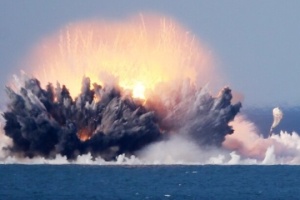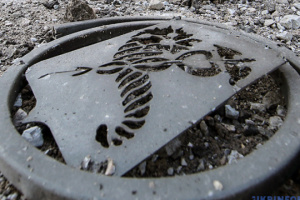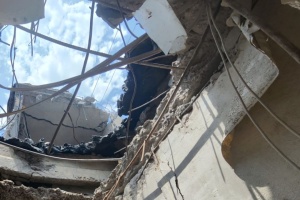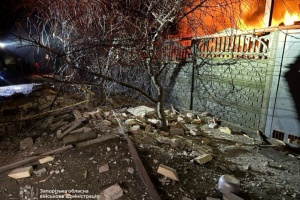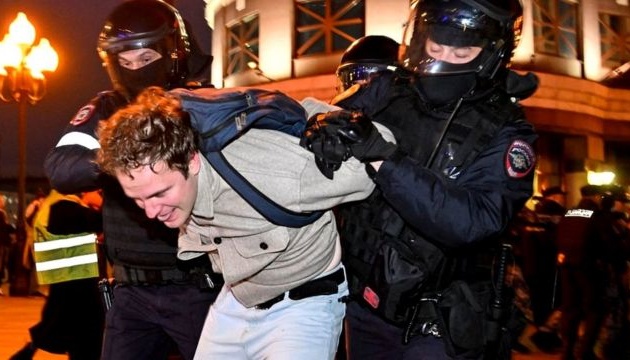
Fortitude of a Russian soldier in te war of conquest: What the mobilization reveals
The mobilization that Russia has announced for the first time since 1941 is indeed like agony. Putinism has driven Russia into a situation where it is to face either a blatant military defeat now or a postponed collapse of the political system provoked by realizing the absurdity and futility of all the sacrifices made.
While until now many Russians could afford not to notice that their country had unleashed a war of aggression, now that the draft notice can be served to almost every Russian family, this matter has become acute. What to die for? What is this war for? Was it Russia that was attacked, or was it the Putin regime that unreasonably attacked a neighboring country without properly assessing own might?
The announcement of the call-up triggered “honesty” on the part of Russian propagandists. We learned what we guessed — the morale and fighting qualities of the Russian army in the war waged against Ukraine are quite low.
Propagandist Aleksandr Kots (like Zakhar Prilepin before) admitted that, in fact, part of the military are refusing to go on combat missions: “Someone just got scared, someone said honestly that they could not solve the problem by the means available to them, someone simply had no motivation: ‘Why die for someone else’s land?’”
The “Vot Tak” project published photos of the reports of soldiers requesting resignation. These documents were seized on August 30, 2022, at the Russian headquarters of the Izium group.
One of the reports bears the name of the commander of the military unit 31135 (Motor Rifle Division in the “elite” Taman Division) Sergeant Azhgaliyev. A person with such a name and initials had been put into the “Book of Executioners of the Ukrainian People” database for his participation in the invasion of Ukraine.
“I ask you to dismiss me, commander of the 2nd anti-aircraft missile department of the 2nd anti-aircraft missile platoon of the anti-aircraft missile battery Sergeant I.O. Azhgaliyev, from the ranks of the Armed Forces of the Russian Federation due to physical and moral fatigue from participation in the SMO on the territory of Ukraine,” writes the 28-year-old native of Saratov region.
The refusal of the Russian military to participate in the SMO, the losses, and the fleeing of forces from Kharkiv region scared the Kremlin. So Moscow had to try to solve the problems of “crackdown” and mobilization. The lack of motivation was to be overcome by branding the occupied areas of Ukraine as part of Russia.
“Today, the situation is radically changing. There are no moral or legal loopholes for cowardice. Now we will live by the laws of wartime. And we bear responsibility for our actions as well. For this purpose, new provisions are introduced in the Criminal Code — on desertion, non-compliance with orders, and looting… To this end, we will soon add new territories — now there can be no questions for whose land we are fighting there. For ours. And there can be no illusions. If we cede at least an inch, they will not stop,” writes Russian “war correspondent” Kots.
The Kremlin regime has been saying for years that Ukrainians are not able to and will not fight because this is a “fake country,” but in reality, it’s the Russian army that turned out to be unable to fulfil its task. This is what self-assuredness leads to.
The Kremlin fears a repeat of history when the Russian army in World War I was propagandized by revolutionary forces and refused to fight, as one of Putin’s favourite historical characters, Anton Denikin, wrote. Therefore, additions were made to the Criminal Code, which introduce penalties for surrendering, desertion, non-compliance with orders, and refusal to fight.
It is not known how a Russian soldier, who signed a short-term contract, will react to the change of the “rules of the game” by the regime. Neither is it known how soldiers or those newly-mobilized forces will act after realizing that Russia is almost the only country in the world that prohibits its soldiers from surrendering, threatening to imprison for it.
According to the Kremlin, this should solve the problem of the Russian army’s lack of resilience. Propagandist Solovyov said the following: “Signing a contract does not mean going to a training ground to shoot in peacetime while refusing to participate in a special military operation! No, you can’t just run away. Are you a coward? Got scared? Now, you will be punished for it. A great deal. If you dodge draft, you get a serious, real prison term for this. So that there are no more such stories as we saw near Kharkiv.”
Crackdown and patriotic engagement of Russians in fake referenda, “this is now Russia,” and “we are fighting for our land” are a mix of ingredients that whose impact on the morale of the army and the invasion at the next stage of the war is yet to be seen.
The latest referenda negate the notion of Russia’s territorial inviolability. After all, if today some territory easily becomes “Russian,” then tomorrow, just as easily, some other region may cease to be Russian. There are two sides to this moon.
By the way, the emergence of regional formations in Russia, in addition to Kadyrov’s army, only brings closer the moment of the upsurge of political ambitions of the Russian federal subjects. For example, according to the Russian website Versia.ru, regional self-identification is important: “…in Tatarstan, two battalions are created at once — “Alga” and “Timer” (in Tatar, this means “Forward” and “Iron”, respectively). They are supposed to be formed only from the natives of Tatarstan so that the countrymen would hold on to each other. Meanwhile, the Atal communications battalion in Chuvash (in Chuvash, it means Volga) registers only local residents with knowledge of the Chuvash language.”
The authoritarian system can lie to people about the threat posed by “Nazis” or NATO, but it is difficult to effectively motivate people to wage a long-range war of aggression.
The potential for inspiration in Putinism is well illustrated by Kadyrov’s publication following the announcement of mobilization. He labeled those who don’t want to kill and die in Ukraine as traitors and second-hand people. “I am talking to you, the one trying to avoid the army. You can invent various excuses. You can say that you do not support the current policies. You can make up a nice story that the idea of war and concept of weapons are alien to you, or that you simply don’t accept violence. But you should know, you are nothing but a coward, a traitor, and a second-class person.”
Thus, the Kremlin, just like in World War II, is trying to win the war by sheer numbers. It should be added that from the military standpoint, a new influx of fighters, even bad ones, is of course a challenge for Ukraine’s defense forces. At the same time, the number of Russians will also increase who will really want to grasp the “Ukrainian issue” and feel that the regime has unscrupulously lied for years about the war in Ukraine, which it unleashed itself. Part of the mobilized soldiers will fight and die in Ukraine. Some will sabotage orders and surrender at the first opportunity. There were both categories among those mobilized from Donetsk and Luhansk regions.
The Putin regime needs pseudo-referenda to continue the shameless mobilization of residents in the occupied territories of Ukraine and send them to fight against their own country, violating the IHL and intending to make this conflict go down in history as “civil war.”
As for the morale of the rank-and-file Russian officers, they cannot help but see that this war — with mass killing of civilians, looting, torture, and violence — has become a disgrace for the Russian army. To be fair, some say that dignity of Russian officers should have been forgotten immediately after the killings in Ilovaisk. The executions of civilians in Bucha, Izium, and many other cities, which took place with the knowledge of the Russian officers, only confirm this.
The terror which served as the basis of the Bolsheviks’ power remains relevant a hundred years later. Evident recruitment by PMCs of Russian convicts has shown that Russia has no rules even for one of its main pillars, which is the army. Following 2014, Russian propaganda span stories about the “private army of oligarch Kolomoiskyi” — but instead, Russia obtained a private army of prisoners, hired by Yevgeny Prigozhin.
Russian “military correspondents” point out overstrain and problems with stimulators: “during long combat work, various stimulators are used today.” Could it be an explanation for the abnormal behavior of Russian soldiers?
Citing American officials, NYT reports that Putin has recently started to more actively interfere in the conduct of the war — among other things, he rejected the proposal put forward by his military to withdraw from the right bank of the Dnipro River in Kherson region to avoid his forces from being encircled. Before the war, Putin was also warned by the military that the capture of the entire territory of Ukraine with available forces was unrealistic, but he ignored them all. Therefore, the tension between the army and its commander-in-chief is one of the factors in this war that cannot but affect the morale of the Russian forces.
The Ukrainian Army has a psychological advantage because it is waging a fair war. The democratically elected leadership has a solid margin of legitimacy. The civilized world supports the country. The Ukrainian Army conducts rotations more often, which provides the necessary rest. It is better equipped than the Russian one and has better food ratios and medical care.
“Mobilization, are we doing the right thing by going this way? Yes. We don’t have as many fighters. Fresh forces are needed, and we will begin to rotate our divisions and brigades, which have been fighting ceaselessly for seven months. It will be much easier for current fighters and newcomers than it was in the February debut,” explains Sladkov.
However, when the Russians return home from the unjust war, they will take some injustice with them, to Russia. Hundreds of thousands of people “soiled” in crimes without consent by the regime will go back to their civilian lives and commit crimes again, this time in Russia. And this is the main thing that the Russians just fail to understand.
The unexpected resistance put up by Ukrainians, heavy losses, and failure in the Kharkiv region undermined the morale of Putin’s army, which the regime is trying to compensate with mobilization.
In this situation, information operations run by Ukraine and its partners become one of the key factors in curbing Ruscism, which has weaponized lies and is now threatening the world because of its unstoppable desire to dominate.
President Volodymyr Zelensky of Ukraine also felt this moment was special and addressed Russians in their native language, urging them not to partake in mobilization, to fight against the Kremlin regime, or to surrender. He also urged Ukrainians under occupation to sabotage the call-up and provide intelligence tips to Ukraine.
How will Russians respond when their relatives and friends, mobilized by force, will start getting captured in Ukraine? Will they finally realize that their true enemy is their own dictator? It can be assumed that the response will be stronger than it was when it was mostly a professional army that was involved in combat missions.
Meanwhile, Ukrainian soldiers will go down in history as heroes. For their country, they will be heroes who defended their home and who strive to change the world for the better. But how will history see Russian occupiers?
Center for Strategic Communication and Information Security

